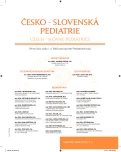A girl with karyotype 46, XY – case report
Authors:
Z. Blusková; Ľ. Košťálová
Authors‘ workplace:
II. detská klinika LFUK a DFNsP, Bratislava
prednosta prof. MUDr. L. Kovács, DrSc., MPH
Published in:
Čes-slov Pediat 2013; 68 (2): 113-118.
Category:
Case Report
Overview
The case of a girl born with a disorder of sexual differentiation has been described. At the newborn age the child was assigned to the female sex only on the basis of greater macroscopic resemblance of external genitals. The clitoris was growing with the child and at the age of 6 years the size reached 3 cm and protruded from the labia. That was the reason why the family decided to visit a doctor. The genetic examination revealed karyotype 46 XY. In the course of the subsequent more than two years, various specialists were attended for establishment of diagnosis and therapy. As late as at the age of 8.5 years, the helpless mother decided to come for a consultation to endocrinology out-patient of 2nd Children Clinic, Medical Faculty and Children Faculty Hospital in Bratislava. The child was then hospitalized for solution of the condition.
MR imaging revealed the rudimentary male internal organs were present, whereas the female counterpart was not. Laboratory examinations were within normal limits for the given age. Under the present conditions it was not possible to establish final diagnosis. In view of the age, upbringing to a female direction and girl’s behavior and feelings, and considering the parents’ desire, the patient was left with the female sex. The inguinal tissues (susp. testes) were extirpated and histological findings revealed hypoplastic testes without Leydig cells. The external genitals of the patient were adjusted to the female direction.
Key words:
sexual differentiation disorders, 46 XY, insufficient formation and influence of androgens
Sources
1. Svechnikov K, Landreh L, Weisser J, et al. Origin, development and regulation of human Leydig cells. Horm Res Paediatr 2010; 73 : 93–101.
2. Nef S, Parada LF. Hormones in male sexual development. Genes&Dev 2000; 14 : 3075–3086.
3. Hughes IA. Minireview: Sex differentiation. Endocrino-logy 2001; 142 : 3281–3287.
4. Lee PA, Houk CHP, Ahmed SF, Hughes A. Consensus statement on management of intersex disorders. Pediatrics 2006; 118 : 488–500.
5. Galani A, Kitsiou-Tzeli S, Sofokleous CH, et al. Androgen insensitivity syndrome: clinical features and molecular defects. Hormones (Athens) 2008; 7 : 217–229.
6. Swanson ML, Coronel EH. Complete androgen insensitivity with persistent Mullerian structures. A case report. J Reprod Med 1993; 38 : 565–568.
7. Tanaka Y, Matsuo N, Aya M, et al. Persistent Müllerian duct remnants in three siblings with partial androgen insensitivity. Horumon To Rinsho 1995; 43 : 3–8.
8. Miller WL, Auchus RJ. The molecular biology, biochemistry, and physiology of human steroidogenesis and its disorders. Endocr Rev 2011; 32 : 81–151.
9. Lisá L. Poruchy gonád na genetickém podkladě. In: Lisá L, Seemanová E, Zuntová A. Poruchy funkce gonád. Praha: Triton, 2004 : 11–93.
10. Imperato-McGinley J, Zhu YS. Androgens and male physiology the syndrome of 5alpha-reductase-2 deficiency. Mol Cell Endocrinol 2002; 198 : 51–59.
11. Latronico AC, Segaloff DL. Naturally occurring mutations of the luteinizing-hormone receptor: lessons learned about reproductive physiology and G protein – coupled receptors. Am J Hum Genet 1999; 65 : 949–958.
12. Mendonca BB, Domenice S, Arnhold IJ, Costa EM. 46, XY disorder of sexual development (DSD). Clin Endocrinol (Oxf) 2009; 70 : 173–187.
13. Pleskačová J, Šnajderová M, Lebl J. Poruchy pohlavního vývoje: Současná doporučená klasifikace a nové poznatky o poruchách vývoje gonád. Čes-slov Pediat 2010; 65 : 79–85.
Labels
Neonatology Paediatrics General practitioner for children and adolescentsArticle was published in
Czech-Slovak Pediatrics

2013 Issue 2
- What Effect Can Be Expected from Limosilactobacillus reuteri in Mucositis and Peri-Implantitis?
- The Importance of Limosilactobacillus reuteri in Administration to Diabetics with Gingivitis
-
All articles in this issue
- A survey of patients diagnosed with X-linked lymphoproliferation disease (XLP) in the Czech Republic and Slovakia
- The emotional impact of the text of cigarette package health warning on older school age and adolescent children
- The association between glutathione S-transferase T1 and M1 gene polymorphisms and microalbuminuria and incipient nephropathy in children with type 1 diabetes mellitus
- Deficit of GATA-2 transcription factor: new immunodeficiency syndrome with broad phenotype. First patients diagnosed in the Czech Republic and review of the literature
- A girl with karyotype 46, XY – case report
- Development of gut microbiota and risks of probiotics use in immunocompromised children
- Czech-Slovak Pediatrics
- Journal archive
- Current issue
- About the journal
Most read in this issue
- A girl with karyotype 46, XY – case report
- Development of gut microbiota and risks of probiotics use in immunocompromised children
- A survey of patients diagnosed with X-linked lymphoproliferation disease (XLP) in the Czech Republic and Slovakia
- Deficit of GATA-2 transcription factor: new immunodeficiency syndrome with broad phenotype. First patients diagnosed in the Czech Republic and review of the literature
